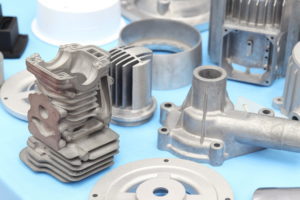The Single Strategy To Use For Stahl Specialty Company
The Single Strategy To Use For Stahl Specialty Company
Blog Article
About Stahl Specialty Company
Table of ContentsWhat Does Stahl Specialty Company Do?Stahl Specialty Company - An OverviewThe 9-Minute Rule for Stahl Specialty CompanyStahl Specialty Company Things To Know Before You Get ThisThe Main Principles Of Stahl Specialty Company
The subtle difference hinges on the chemical material. Chemical Comparison of Cast Light weight aluminum Alloys Silicon advertises castability by reducing the alloy's melting temperature and improving fluidness throughout casting. It plays an essential function in enabling complex molds to be filled precisely. In addition, silicon adds to the alloy's stamina and put on resistance, making it valuable in applications where longevity is vital, such as auto parts and engine parts.It additionally enhances the machinability of the alloy, making it easier to refine into completed products. In this way, iron adds to the overall workability of aluminum alloys. Copper increases electric conductivity, making it useful in electric applications. It also enhances deterioration resistance and adds to the alloy's overall toughness.
Manganese adds to the stamina of aluminum alloys and enhances workability. It is frequently made use of in functioned light weight aluminum items like sheets, extrusions, and profiles. The presence of manganese aids in the alloy's formability and resistance to fracturing during manufacture procedures. Magnesium is a light-weight component that offers stamina and effect resistance to aluminum alloys.
Zinc improves the castability of aluminum alloys and aids manage the solidification process throughout casting. It improves the alloy's strength and solidity.
The Best Strategy To Use For Stahl Specialty Company
Because aluminum-silicon alloys have good casting residential properties, high gas residential or commercial properties, easy processes, and outstanding corrosion resistance, aluminum-silicon alloys are most commonly made use of in the die-casting sector in your home and abroad. At the same time, aluminum-silicon alloys are additionally relatively very early and commonly acknowledged alloys created and utilized in die-casting. After continuous study and improvement, many of the existing international mainstream aluminum-silicon alloys have been completed and are nothing more than A356, A360, A380, ADC12, B390, and A413.
The key thermal conductivity, tensile toughness, yield toughness, and prolongation vary. Amongst the above alloys, A356 has the highest thermal conductivity, and A380 and ADC12 have the lowest.

The 6-Minute Rule for Stahl Specialty Company
In accuracy casting, 6063 is well-suited for applications where elaborate geometries and high-quality surface area finishes are extremely important. Instances consist of telecommunication rooms, where the alloy's remarkable formability allows for sleek and cosmetically pleasing styles while maintaining architectural integrity. Likewise, in the Lights Solutions sector, precision-cast 6063 elements produce classy and efficient lighting fixtures that call for complex forms and good thermal efficiency.
(https://www.figma.com/design/5dtta9biYAvurKhKjAAp7p/Untitled?node-id=0-1&t=AoovjzyjwBUdKG93-1)
It results in a finer surface finish and better corrosion try this resistance in A360. Moreover, the A360 exhibits premium prolongation, making it perfect for facility and thin-walled parts. In accuracy casting applications, A360 is fit for sectors such as Consumer Electronics, Telecommunication, and Power Devices. Foundry. Its enhanced fluidity permits detailed, high-precision elements like mobile phone housings and interaction gadget real estates.

In precision casting, aluminum 413 beams in the Consumer Electronics and Power Equipment industries. It's generally utilized to craft detailed parts like mobile phone housings, electronic camera bodies, and power device casings. Its precision is exceptional, with tight resistances approximately 0.01 mm, ensuring flawless product setting up. This alloy's remarkable deterioration resistance makes it an excellent option for exterior applications, ensuring long-lasting, long lasting products in the stated sectors.
Excitement About Stahl Specialty Company
The aluminum alloy you select will significantly influence both the casting procedure and the properties of the last item. Since of this, you must make your decision meticulously and take an enlightened technique.
Figuring out the most ideal light weight aluminum alloy for your application will certainly indicate evaluating a large variety of attributes. These comparative alloy attributes adhere to the North American Die Casting Association's guidelines, and we've divided them right into two classifications. aluminum foundry. The initial classification addresses alloy characteristics that affect the manufacturing procedure. The second covers attributes influencing the buildings of the final item.
The alloy you choose for die casting directly influences numerous elements of the spreading procedure, like just how very easy the alloy is to function with and if it is prone to casting defects. Hot breaking, also called solidification splitting, is a typical die casting flaw for light weight aluminum alloys that can result in internal or surface-level rips or fractures.
The Best Strategy To Use For Stahl Specialty Company
Particular light weight aluminum alloys are a lot more prone to warm cracking than others, and your selection ought to consider this. Aluminum Castings. It can harm both the cast and the die, so you ought to look for alloys with high anti-soldering homes.
Rust resistance, which is already a notable attribute of light weight aluminum, can differ significantly from alloy to alloy and is a vital characteristic to consider depending on the ecological conditions your product will be exposed to. Wear resistance is another residential property generally looked for in light weight aluminum products and can differentiate some alloys.
Report this page